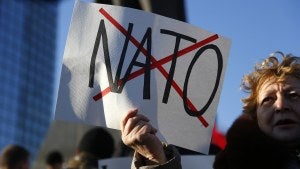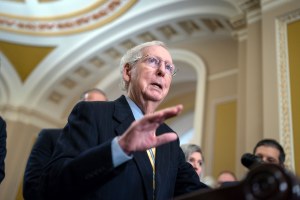Republicans with a somewhat favorable or unfavorable view of the former president are more likely to say US assistance to Kyiv has been worth the cost.
On foreign policy, Republican Party candidates sharply disagree on US involvement in Ukraine. Front-runner Donald Trump has said that he would cut off the “endless flow of American treasure to Ukraine” though hasn’t clarified what exact steps he would take otherwise. Meanwhile, Nikki Haley argues that US aid to is aimed at preventing the conflict from spreading more widely and helping a “pro-American, freedom-loving country.”
This stark division is also apparent among Republican Party supporters. A survey conducted by the Chicago Council on Global Affairs in September finds that a majority of “Trump Republicans”—those who express a very favorable view of the former president (47% of all Republicans)1—oppose continued aid to Ukraine. On the other hand, a majority “non-Trump Republicans”—those who express a somewhat favorable or unfavorable view of Trump (53% of all Republicans)—favor continued US assistance.
Key Findings
- Trump Republicans are much less likely than non-Trump Republicans to say that the amount of military aid the United States has provided to Ukraine has been worth the cost (29% vs. 46%).
- Only minorities of Trump Republicans favor ongoing economic (33%) and military aid (40%).
- In contrast, majorities of non-Trump Republicans favor ongoing US economic and military aid to Ukraine (59% each).
- Nearly all Republicans—regardless of their opinion of former President Trump—think Russian President Vladimir Putin is to blame for the war. But a slim majority of Trump Republicans think that Ukrainian President Volodymyr Zelenskyy is also to blame (54% vs. 31% of non-Trump Republicans).
Trump Republicans More Likely to Question Value of US Military Aid
The criticisms of the current US aid policy to Ukraine among Republican lawmakers have likely affected everyday Republican Party supporters’ perceptions about the value of continuing assistance to Ukraine, at least on the surface. In the 2023 Chicago Council Survey, conducted September 7-18, 2023, Republicans as a whole were much less likely than other Americans to say that the $43 billion in weapons, equipment, and training to Ukraine since the Russian invasion has been worth the cost (38% of all Republicans vs. 51% of Independents and 69% of Democrats).
But not all Republicans think alike. Those with a very favorable opinion of Trump (“Trump Republicans”) are much less likely to say the effort has been worth the cost (29%) than those with a somewhat favorable or unfavorable opinion of the former president (“non-Trump Republicans” at 46%).
Non-Trump Republicans Support Continued Economic and Military Assistance
When asked about specific ways the United States can assist Ukraine, about half of Republicans overall support continued economic assistance to Kyiv (47%) and the provision of additional arms and military supplies to the Ukrainian government (50%).
There are large differences between Trump and non-Trump Republicans on this question. Only a third of Trump Republicans favor continued economic aid (33%) in contrast to six in 10 non-Trump Republicans (59%). In a similar pattern, four in 10 Trump Republicans favor sending additional arms and military equipment to Kyiv (40%) compared to six in 10 non-Trump Republicans (59%).
Many Trump Republicans Think Zelenskyy Partly to Blame for the War
While nine in 10 Trump (91%) and non-Trump Republicans (93%) place the blame for the war on Putin, a slim majority of Trump Republicans also place part of the blame on Zelenskyy (54% of Trump Republicans vs. 31% of non-Trump Republicans). Trump Republicans are also slightly more likely than non-Trump Republicans to say that NATO and the United States are to blame.
Conclusion
In mid-December, Zelenskyy traveled to Washington, DC, to convince Republican leaders to continue funding Ukraine’s war effort. However, so far his efforts seem to have been in vain, as Republicans remain unwilling to concede additional aid to Kyiv, unless it is paired with changes to US immigration policy—which would put President Joe Biden in a bind with the progressive wing of his own party.
These results show that since about half of Republicans among the US public are, in fact, Trump Republicans, the opposition to continued aid to Ukraine of many “MAGA” GOP leaders reflects the preferences of their core constituency. But if the Biden administration is able to compromise on a deal which addresses border enforcement, perhaps even Trump supporters would support it since immigration rates as their top foreign policy concern.
1. Among the overall US public, 27% self-identify as Republican party supporters. See the Methodology section for more details on “Trump Republicans” and “non-Trump Republicans”.
This analysis is based on data from the 2023 Chicago Council Survey of the American public on foreign policy, a project of the Lester Crown Center on US Foreign Policy. The 2023 Chicago Council Survey was conducted September 7–18, 2023, by Ipsos using its large-scale nationwide online research panel, KnowledgePanel, in both English and Spanish among a weighted national sample of 3,242 adults 18 or older living in all 50 US states and the District of Columbia. The margin of sampling error for the full sample is ±1.7 percentage points. The margin of error is higher for partisan subgroups or for partial-sample items.
Partisan identification is based on how respondents answered a standard partisan self-identification question: “Generally speaking, do you think of yourself as a Republican, a Democrat, an Independent, or what?”
The 2023 Chicago Council Survey is made possible by the generous support of the Crown family, the Korea Foundation, and the United States-Japan Foundation.
Among the overall US public, 27 percent self-identify as Republican Party supporters. For the purposes of this analysis, “Trump Republicans” refers to those Republican Party supporters who express a very favorable opinion of Donald Trump (47% of overall Republicans, 13% of the public overall). Non-Trump Republicans are those who express only a somewhat favorable or unfavorable view of the former president (53% of overall Republicans, 14% of the public overall). The proportion of Republicans who hold a very favorable view of him has varied over time, with generally just over half of self-identified Republicans holding a very favorable view of Trump (see below figure).
Demographically, Trump and non-Trump Republicans look similar aside from education. Trump Republicans are notably more likely to have a high school education or less, while non-Trump Republicans are more likely to have a bachelor’s degree (or a more advanced degree).


Related Analysis
 US Foreign Policy
US Foreign Policy
Republicans with very favorable views of Trump are more likely than other GOP backers to support deportations for undocumented immigrants.
 US Foreign Policy
US Foreign Policy
Six in 10 continue to support providing economic aid and sending additional arms and military supplies to the Ukrainian government, down slightly from a year ago.
 Public Opinion
Public Opinion
A majority of the US public continues to back current military and financial aid to Kyiv, recent polls find.
 Public Opinion
Public Opinion
The Russian public is concerned about NATO expansion but does not think an attack from the West is imminent.
